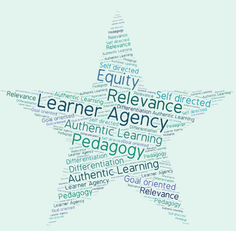Student Ownership
|
Student Ownership of Inquiry
When considering the matter of student ownership of the inquiry, the ideal situation is where students have full ownership of the initial question, idea, problem or issue. I totally agree that this is what we should be aiming for, however the reality in the classroom is that many students don’t have the skills to come up with rich questions until these skills have been taught. So how do we achieve this ownership in the classroom and still cover the topics we consider are important for students, but for which they show little interest? How for that matter do we work on topics they don’t even know exist? Posing Questions of Emerging Relevance More illumination on this matter comes from reading Jacqueline Brooks’ book ‘In Search of Understanding: The Case for Constructivist Classrooms’ which seems to offer some answers evidenced in this quote: “Critics contend that the constructivist approach stimulates learning only around concepts in which the students have a pre-kindled interest. Such criticisms miss the mark. Posing problems of emerging relevance is a guiding principle of constructivist pedagogy. However, relevance does not have to be pre-existing for the student. Not all students arrive at the classroom door interested in learning about verb constructs, motion and mechanics, biological cycles, or historical timelines, but most students can be helped to construct understandings of the importance of these topics. Relevance can emerge through teacher mediation. " (Brooks, 1999, p.35) Brooks goes on to explain some of the ways we can kindle that interest thus giving students ownership of their inquiry. This fits well with my ideas about guided inquiry. It also fits well with the immersion or knowledge attack/ provocation stage of an inquiry. The Galileo Network Inquiry Rubric has criteria for authenticity and student ownership of an inquiry topic which is also well worth a look. For more thoughts on this topic see the page on Inquiry Levels and Authenticity. 
Learner Agency
Learner agency is about giving learners control of their learning and empowering them to make decisions about their own learning. It is an important part of student inquiry. Students need to know that they can make a difference in their world and authentic inquiry is one way they can achieve this. We cannot, however, expect learners to assume full control of their learning if they don't have the skills they need. This is where guided inquiry and scaffolding come into play. One major way we can give learners more agency is by involving them in the decision-making around inquiries. For example, instead of telling them the inquiry topic, follow their lead on questions that interest them, be clear on your purpose then ask provocative questions or use prompts to challenge their thinking and, with support, get them to come up with essential questions for inquiry. I discuss this concept further on the Inquiry Levels page and in my blog post Ask, Don't Tell. |
"It is just as mistaken to sacrifice the adult to the child as to sacrifice the child to the adult. It is sentimentalism to assume that the teaching of life can be fitted always to the child’s interests just as it is empty formalism to force the child to parrot the formulas of adult society. Interests can be created and stipulated."
(Bruner (1971) p. 117) "Learning that is characterized by learning agency recognizes learners as active participants in their own learning and engages them in the design of their experiences and the realization of their learning outcomes in ways appropriate for their developmental level. As such, learners have choice and voice in their educational experiences as they progress through competencies. Harnessing his or her own intrinsic motivation to learn, each learner strives to ultimately take full ownership of his or her own learning."
Education Reimagined References
|
2021


